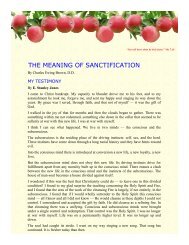W. B. Godbey - Enter His Rest
W. B. Godbey - Enter His Rest
W. B. Godbey - Enter His Rest
Create successful ePaper yourself
Turn your PDF publications into a flip-book with our unique Google optimized e-Paper software.
throughout the Movement, which now girdles the world. Hence you see how multitudinous are the open doors<br />
on all sides, ringing out their Macedonian cry, “Come over and help us.” I would be most delighted to spend<br />
life's evening with my dear old companion, whom God has made an angel of mercy, shining along my<br />
pilgrimage these forty-four years; and meanwhile my preaching son and son-in-law do beg me hard to quit work<br />
and give them a chance to take care of me and their mother as long as we live. Here you see what sanctification<br />
does for us. If I did not have it, I would certainly accept that kind offer and superannuate, but it really makes us<br />
young forever, opening for me a thousand delectable doors, which I would be so delighted to enter, as I love the<br />
work so dearly that I surely will continue on the battlefield till the chariot descends and the angels bid me mount<br />
aboard. Therefore life's evening with the sanctified is infinitely better than the most successful blooming youth<br />
without it.<br />
I remember when I was a student in college I read in the Latin language in the course of study, “Cicero on Old<br />
Age.” This prince of Roman orators and champion statesman with his trenchant pen undertakes to show up the<br />
possibilities of the bright, cheerful, contented, happy, sunshiny old age.<br />
<strong>His</strong> argument is really able for a heathen philosopher. He shows up the facilities of science, literature,<br />
philosophy, poetry, aesthetics and the pagan religions to fill old age with perennial flowers, ever ripening fruits,<br />
and glorious sunshine. However the end of his life by suicide casts a shadow over all of his eloquent and able<br />
writings on the serenity, tranquillity, placidity, quietude and resignation which characterized the declining years<br />
of the philosopher. When the decisive battle of Actium sealed the doom of the Republic in which Cicero had<br />
spent his life, and he saw it go down in the gloom of an eternal night and the Monarchy superseded it, yielding<br />
to the temptation of a broken heart he committed suicide. If that great orator and statesman had only enjoyed the<br />
light of Christianity, he could have shouted victory for his own soul while the Republic went down. No tongue<br />
can tell the unutterable glories of the full salvation which sweetens declining years, and makes us bloom in<br />
immortal youth forever.<br />
Chapter 14<br />
THE EXODUS<br />
It is more suitable, as a rule to write the life of a person after the journey is over because we then have access to<br />
all of the facts. Now I have gone through mine from the cradle to the final exodus,<br />
I.e., the departure out of this world, which someone else will have to write, after I shall have exchanged the<br />
battlefield for the Mount of Victory, labor for rest and earth for Heaven. Of course the writer of this last chapter,<br />
if it ever is written, must have an intimate acquaintance with the subject of the biography. Rev. H. C. Morrison,<br />
of the “Pentecostal Herald,” has known me intimately all his life. I am twenty-four years his senior. I heard him<br />
say in a great sermon which he delivered to an immense campmeeting audience, that I passed him while he was<br />
a little bare-foot boy, put my hand on his head, lifted up my voice and said, “O Lord, make a preacher of this<br />
boy.” He says that moment he heard the call from Heaven, which never evanesced from his juvenile mind, but<br />
he held on and developed into the noble preacher of the Gospel we all so much appreciate he is not only my<br />
Gospel son, but the consanguinity of my dear wife; she and his mother both being Durhams members of the<br />
same good old English family, their grandfather, John Durham the first Methodist class-leader in Kentucky,<br />
coming over the Cumberland Mountains from old Virginia, with Daniel Boone, the pioneer.<br />
As life is uncertain, I will in this connection also give the name of my son-in-law, Rev. F. M. Hills, so he and<br />
Brother Morrison can mutually follow the leading of the Spirit in the matter, the one serving as the alternate of<br />
the other.<br />
I will avail myself of this opportunity to write my last will and testament. In the providence of God all of our<br />
children have gone to Heaven but one, my son William H., who is a faithful preacher of the Gospel, and has<br />
faith in God to feed him like He feeds the birds and to clothe him like the lilies. Therefore I shall not will him<br />
nor any of my consanguinity one cent, but leave it all for the missionaries, when I am gone. I have no real estate,<br />
never did own but one hundred and seventy-three acres of land, and donated every inch of it to Kentucky









